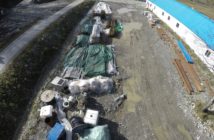Podgorica, 1 December 2010 – MANS is calling on the Ministry of Economy to publicly post the recent agreement on the establishment of an underwater energy cable between Montenegro and Italy on its website. The agreement was signed last week in Podgorica with the representatives of Italy’s Terna.
Through this underwater cable, the government seems intent on increasing the indebtedness of Montenegro’s taxpayers by another 100-million euros (or more), without securing any guarantees that its citizens will be paying less for electricity in the future. Unlike the Montenegrin government, Terna has already promised Italian consumers cheaper electricity prices, energy that is likely to be imported from our hydropower stations along the Morača river (and other sources that are still in the planning stages).
Given that Montenegro is already going into further debt in order to build the hydropower stations along the Morača, the government should explain why it is intent on driving the country into a situation of “energy and debt slavery,” thus destroying domestic energy sources in order to offer-up them up to Italy for virtually nothing.
It is well known that Italian companies have in recent years been making considerable profits by reselling electrical energy imported from abroad, allowing Italy to protect its own resources in the process. It is already clear that the underwater cable between Montenegro and Italy is being exclusively built to transport electricity to Italy.
Even though the Ministry of Economy has called the underwater cable agreement with Terna the “deal of the decade” – announcing that Montenegro’s budget will reap between 10-million to 40-million euros a year from the transit of energy through its territory – it has yet to demonstrate how it came to this estimate. Nor, as in the case of the cost-benefit analysis for the Morača river projects, has it shown on what basis such earnings will be conditioned.
The Ministry also needs to explain how much Montenegro will have to invest in its energy distribution networks to ensure that the cable can even begin functioning, not to mention the need to build new transformer installations across our territory and the impact this would have on the environment. Given the information on the deal, this sale will cost Montenegro’s citizens even more due to the planned construction of transmission lines form the Montenegrin coast to Pljevlja and to Višegrad/Trebinje.
Simultaneously, the Ministry of Spatial Planning and Environmental Protection is staying quiet about the “green light” it has given planners to plot transmission lines through protected areas of the Lovćen National Park. Similarly, the residents of Lastva Grbaljska have still not been informed that the construction of converter plants is being planned for Blato, whose dimensions will be equivalent to the size of four football stadiums. Concerning the effect that such facilities will have on the environment, it is sufficient to note their permanent impact on the landscape.
In the Italian region of Abruzzo, citizens have already begun spirited protests against the plan and are demanding that local authorities cancel the underwater-cable agreement. Given suspicions of corruption, Italian prosecutors may become involved. In Montenegro, the full consequences of the deal have yet to be made public.
All this goes to show that the Ministry of Economy, following the Morača river project, has entered into yet another non-transparent process with Italian partners behind closed-doors. The public has once again been presented with a fait-accompli.
Instead of the empty rhetoric heard from Minister Branko Vujović during the signing of the agreement, concerning the alleged employment and GDP benefits of the deal, citizens should be clearly told what the actual benefits of this project are in-light of the enormous amounts of tax-payer resources that will be spent on it.
Ines Mrdovic
Urban Development Programme Assistant



